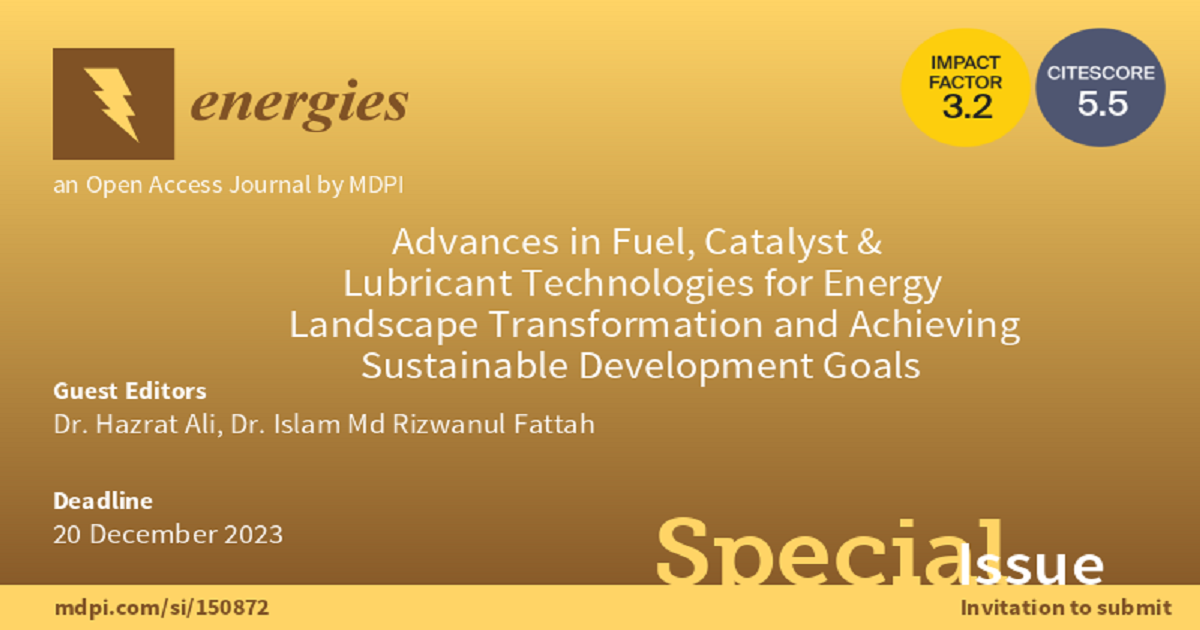Advances in Fuel, Catalyst & Lubricant Technologies for Energy Landscape Transformation and Achieving Sustainable Development Goals
A special issue of Energies (ISSN 1996-1073). This special issue belongs to the section "I1: Fuel".
Deadline for manuscript submissions: closed (20 December 2023) | Viewed by 370

Special Issue Editors
Interests: automotive engineering; energy and fuels; data analysis; thermodynamics; process engineering; waste-to-energy, and environmental sustainability
Special Issues, Collections and Topics in MDPI journals
Interests: renewable energy; emissions; nanoparticles; combustion; alternative fuel; machine learning; sustainable materials
Special Issues, Collections and Topics in MDPI journals
Special Issue Information
Dear Colleagues,
The global energy supply system is mostly fossil fuel-dependent, which has created two issues—climate change due to exhaust emissions, and scarcity of fuel supply in coming decades. Not only the conventional fuels such as gasoline, diesel, coal, and nuclear fuels, but also various alternative fuels like biodiesel, bioethanol, shale oil, CNG/LNG, LPG, biogas, thermocatalytic conversion of coals, waste-derived fuels, renewable (wind, hydro, and solar) energies, batteries, and fuel cells have undergone extensive research, development and commercialisation activities. Yet, much work needs to be done at an advanced level to extract energy from all these resources by capturing emissions, increasing energy conversion efficiency, reducing frictional and thermal losses, and improving fuel properties. Recently, focused hydrogen, renewable energies, batteries and fuel cells can only turn into completely green and sustainable energy supply mediums when their total value chains can contribute towards sustainability. Additionally, the fit-for-purpose or segregated moving and contact parts linked to the energy outputs can turn into energy-efficient mechanisms with selective lubricants. Advanced tribology research is expanding beyond mineral and synthetic lubricants to include nanomaterials, ionic liquids, biolubricants, aqueous lubricants, and solid lubricants (i.e., polymer composites, inorganic solids, and metal alloys) for improving process conversion efficiency and energy recovery that would otherwise be wasted due to frictional motions. Catalysts are the key ingredients to improve and expedite desired chemical processes like fuel and lubricants production. Both the catalysts and the lubricants effectively tackle the thermal effects in the system of applications. Production of fuels and lubricants is highly linked to the use of highly efficient and selective catalysts.
Therefore, this Special Issue has focused on welcoming manuscripts (Research/Reviews) from the experts working on identified issues of fuel, catalysts, and lubricants towards the advancement of their application that will potentially lead to future sustainable energy supply and utilisation.
The following are the topics of the Special Issue:
- Advanced fuel (conventional/non-conventional, liquid/gaseous) production and fuel property improvement.
- Alternative fuels, including hydrogen, biofuels, and waste-derived fuels.
- Advancement in energy-efficient combustion processes.
- Lubricants synthesis and tribological analysis of applications.
- Catalysts, including nano-bio-catalysts synthesis and applications.
- Emissions capture and avoidance from renewable energy value chains.
- Advancement in waste-to-fuel production processes.
- Bioethanol, biodiesel, and biomethane.
- Catalysts for Fischer–Tropsch synthesis.
- Hydrogen production (from wastes, fossil fuels, and renewable sources), transportation, utilisation, and use of catalysts and lubricants in the hydrogen value chain.
- Photocatalysis for water splitting for hydrogen production.
- Catalytic decomposition of natural gases for hydrogen production.
- Application of catalysts in gas Separation and storage technologies.
- Circular economic benefits of energy and environmental policy development to guide the advancement of fuel, catalysts, and lubricant technologies.
Dr. Hazrat Ali
Dr. Islam Md Rizwanul Fattah
Guest Editors
Manuscript Submission Information
Manuscripts should be submitted online at www.mdpi.com by registering and logging in to this website. Once you are registered, click here to go to the submission form. Manuscripts can be submitted until the deadline. All submissions that pass pre-check are peer-reviewed. Accepted papers will be published continuously in the journal (as soon as accepted) and will be listed together on the special issue website. Research articles, review articles as well as short communications are invited. For planned papers, a title and short abstract (about 100 words) can be sent to the Editorial Office for announcement on this website.
Submitted manuscripts should not have been published previously, nor be under consideration for publication elsewhere (except conference proceedings papers). All manuscripts are thoroughly refereed through a single-blind peer-review process. A guide for authors and other relevant information for submission of manuscripts is available on the Instructions for Authors page. Energies is an international peer-reviewed open access semimonthly journal published by MDPI.
Please visit the Instructions for Authors page before submitting a manuscript. The Article Processing Charge (APC) for publication in this open access journal is 2600 CHF (Swiss Francs). Submitted papers should be well formatted and use good English. Authors may use MDPI's English editing service prior to publication or during author revisions.
Keywords
- fuels
- lubricants
- catalysis
- combustion (SI/CI engines)
- hydrogen production
- technologies for achieving carbon neutrality
- SDG 07






